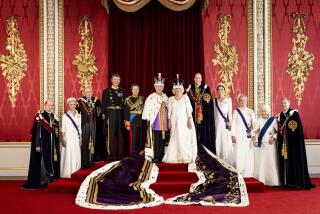Changing Lifestyles : Pity the Poor Prince: He’s Without a Wife at 32 : Japan’s Naruhito is getting less than the royal treatment from potential mates. He’s just too boring, some say.
- Share via
TOKYO — He sits atop 2,600 years of tradition as heir to the Chrysanthemum Throne and Japan’s ultimate symbol of a pure, if mythical, family line unbroken for generations.
But the crown prince of Japan has a problem his royal ancestors could never have imagined: He can’t seem to get hitched.
With the passage of his 32nd birthday Feb. 23, Prince Naruhito’s marriage plight is becoming more and more pronounced. He is now two years behind his scheduled marriage age, announced back when he was 28. Despite a list of potential brides reputed to number in the 70s, he is said by royal-watchers here to be nowhere near finding a wife. Several prospects have reportedly taken themselves out of the running. Meanwhile, he has been eclipsed by his younger brother, Prince Aya, who has married and fathered a daughter.
In an indication of the quiet panic building inside the palace, the Imperial Household Agency in February requested--and won--a three-month news blackout on the prince’s private life. The point was to create a “calm environment” in which to pursue romance. But members of the press corps assigned to cover the palace say things don’t seem to be going well, and the betting among them is that the news blackout won’t produce a bride.
In short, if the idea of becoming the future empress of Japan used to be the Cinderella fantasy of every schoolgirl, it isn’t any longer. Indeed, the prince’s predicament underscores just how much public attitudes toward the royal family have changed over time.
Listen to this 77-year-old Tokyo woman, who recalled during a recent subway ride how she would fall to her knees and bow her head to the ground when the emperor’s train passed in front of her: “He wasn’t a human, he was a god,” she recalled. “I can’t even imagine being able to marry him.”
Ayako Ito, born half a century later, can’t imagine marrying the future emperor either--but for totally different reasons. A graduate of Sophia University who now works in the entertainment division of a major trading firm, Ito sizes up Prince Naruhito on decidedly human terms.
His hair, she says, is “a little too long,” his stature “a little too short.” In a word, she sums up, “He’s not my type. He’s too rigid and serious.”
In a gasping departure from decorum, a Japanese magazine a few years ago counseled the prince that appearance does count among today’s ladies. The magazine drew nine new hairdos atop his smiling face, including a short perm. At the very least, it irreverently advised, the prince should cut his hair and add some mousse. (The article drew a swift rebuke from the Imperial Household Agency.)
Cheeky stuff, perhaps, but indeed the prince seems to be lacking pizazz. He plays the viola. He climbs rocks. His passion is marine transport systems; his master’s thesis was entitled, “Medieval Hyogo Prefecture and Transportation on the Inland Sea.” When a Tokyo TV reporter suggested he should display a bit more passion, the prince replied: “Inside, there is something burning . . . but there is also a need to take a calm approach.”
Kaori Kimijima, a 22-year-old Tokyo clerk, says the prince is worse than boring. He’s irrelevant, she says. “We should get rid of the emperor system altogether,” she declares. “It’s not democracy.”
That tension between old and new, the sacred and profane, tradition and modernity, characterizes the prince’s marriage problems.
In simpler times, such problems would not have occurred because the matter of marriage and propagating the imperial line was a closed-circle affair, with brides selected from other royal families. But after the World War II defeat and Gen. Douglas MacArthur’s democratic reforms, the pool of candidates with royal blood shrank precipitously. And the prince, like his father, became infected with a foreign idea: Choosing his own wife in a love match rather than an arranged marriage.
Yet that desire has been impossible to fulfill, thanks to another postwar change: the rise of the media. At the time the current emperor married his wife, Michiko, television had just developed and there were few news outlets besides newspapers.
Today, however, an explosion of magazines, TV shows and both weekly and daily newspapers cover Prince Naruhito’s every move, making privacy impossible. Indeed, the media frenzy every time a new “candidate” is rumored has been blamed for chasing away several prospective brides and dashing any hopes that a princely romance can blossom naturally.
The family of one candidate, Naoko Taki, spoke out in protest last year after their daughter was held a virtual prisoner in her own home for three days straight while paparazzi cluttered the neighborhood and badgered relatives and friends for news.
Midori Hanabusa, 28-year-old daughter of a Japanese diplomat, still has nightmarish memories of the time she was named a candidate in 1983 and suddenly found herself hounded by the press night and day. “I don’t want to talk about it at all,” she said. “It was like a bad joke.”
And where the Japanese might have supported a more lavish royal lifestyle in the past--considering their tax dollars tithes to the gods--today’s public often grumbles about the public cost of various royal ceremonies. As a result, brides are expected to come from independently wealthy families to help buy their own clothes and jewelry.
Some critics say the qualifications laid down by the Imperial Household Agency are making it exceedingly difficult to find a bride. Because propagating the imperial line is the empress’ most important duty, one candidate was reportedly turned down when an investigation showed that for four generations, her ancestors produced only girls.
Another reputed leading candidate, 28-year-old Masako Owada, was publicly criticized as unsuitable by an Imperial Household Agency official because her grandfather was on the board of directors of the firm responsible for a famous mercury poisoning case in Minamata.
Still, the prince is not without his fans. One woman slipped by the palace’s rigid security on Feb. 14 to try to deliver a box of Valentine’s chocolates to him. And Noriko Minami, a 23-year-old Tokyo office clerk, said she admires the prince’s intelligence and would marry him in a minute.
But given the public pressures, the huge expectations, the loss of freedom--and the prince’s bland reputation--magazine surveys show the majority of young women would politely decline any princely offers.
“I would marry ‘Prince,’ ” Ayako Ito quipped, “if it were the (American rock) musician and not the Japanese.”
Times researcher Megumi Shimizu in Tokyo contributed to this article.
More to Read
Sign up for Essential California
The most important California stories and recommendations in your inbox every morning.
You may occasionally receive promotional content from the Los Angeles Times.














